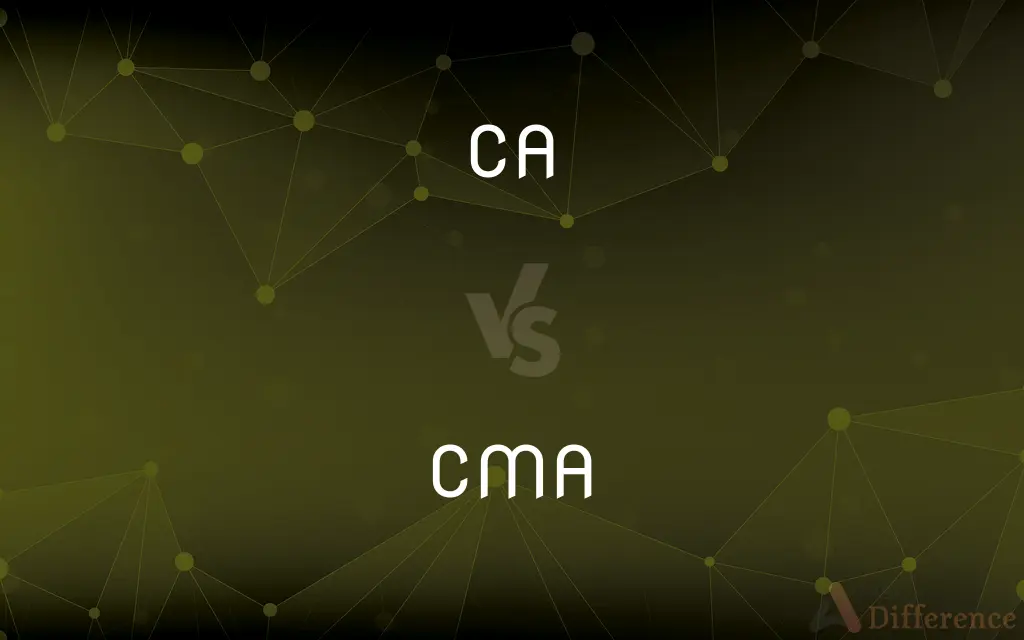CA vs. CMA — What's the Difference?
Edited by Tayyaba Rehman — By Fiza Rafique — Published on December 12, 2023
CA is a Chartered Accountant, focusing on auditing and financial reporting, while CMA is a Certified Management Accountant, emphasizing management accounting and financial strategy.

Difference Between CA and CMA
Table of Contents
ADVERTISEMENT
Key Differences
CA, or Chartered Accountant, is a title for accounting professionals in many countries outside of the USA. This designation is recognized internationally and often relates to services such as auditing, taxation, and financial reporting. CMA, or Certified Management Accountant, is a certification primarily recognized in the USA and signifies expertise in management accounting, emphasizing on strategic management and performance.
CA is typically awarded by professional accounting bodies of respective countries, with the qualification process often involving rigorous exams and relevant work experience. CMA, on the other hand, is a global certification awarded by the Institute of Management Accountants (IMA) in the USA. It underscores the accountant's capability in management decision-making processes and strategy formulation.
A CA usually has a broader scope, which might involve a deep dive into audit, tax, and consultancy. Their expertise is essential for organizations to ensure compliance with financial regulations and standards. CMA, however, is more focused on internal business processes, analyzing financial data to provide strategic insights, and performance management.
In terms of career opportunities, a CA is often seen in roles such as external auditors, tax advisors, or financial controllers. CMA professionals typically occupy positions related to management accounting, financial strategy, or budget analysis. Both CA and CMA are valuable in the corporate world, but their areas of specialization and application differ.
Comparison Chart
Primary Focus
Auditing and financial reporting
Management accounting and strategy
ADVERTISEMENT
Governing Body
National accounting bodies
Institute of Management Accountants (IMA) in the USA
Scope
Broader (audit, tax, consultancy)
Focused (internal business processes, strategic insights)
Typical Roles
External auditors, tax advisors, financial controllers
Management accounting, financial strategy, budget analysis
Geographical Recognition
Predominantly outside the USA
Globally, with strong recognition in the USA
Compare with Definitions
CA
An individual skilled in auditing, taxation, and financial consultancy.
Hiring a CA ensured the firm's financial records were impeccable.
CMA
An individual focused on financial planning, performance management, and decision support within organizations.
With a CMA on board, the company saw improved financial efficiency.
CA
A professional title for accountants who have passed requisite exams and have relevant work experience.
John, a CA, advised the company on tax implications.
CMA
An accolade awarded by the Institute of Management Accountants, primarily in the USA.
Being a CMA gave him an edge in performance management roles.
CA
A recognized title in many countries, highlighting proficiency in accounting standards and regulations.
The CA was called to decipher the complex financial statements.
CMA
A specialist in analyzing financial data to provide actionable business insights.
The CMA's report led to a successful cost-saving initiative.
CA
A designation indicating expertise in various financial domains, awarded by respective national bodies.
As a CA, Mary was in charge of the external audit.
CMA
A certification denoting expertise in management accounting and financial strategy.
The CMA used data to drive the company's future plans.
CA
An accountant responsible for ensuring compliance with financial standards.
The CA worked diligently to ensure all regulatory guidelines were met.
CMA
A professional recognized for skills in internal business processes and strategic financial insights.
As a CMA, Sarah advised on budget allocations.
CA
The chemical symbol for calcium, the fifth most abundant element in the earth's crust.
CA
A white metallic element that burns with a brilliant light; the fifth most abundant element in the earth's crust; an important component of most plants and animals
CA
A state in the western United States on the Pacific; the 3rd largest state; known for earthquakes
Common Curiosities
How does a CMA differ from a CA?
While CAs focus on auditing and financial reporting, CMAs emphasize management accounting and financial strategy.
What does CA stand for in accounting?
CA stands for Chartered Accountant.
Is CA a globally recognized designation?
Yes, CA is recognized in many countries outside of the USA.
Who awards the CMA certification?
The CMA certification is awarded by the Institute of Management Accountants (IMA) in the USA.
Are CAs typically involved in external audits?
Yes, CAs often play roles in external audits, tax advisories, and financial control.
Is a CA designation predominantly recognized in the USA?
No, CA is predominantly recognized outside the USA.
Can a CMA provide strategic financial insights?
Yes, CMAs specialize in providing strategic financial insights based on data analysis.
What's the primary focus of a CA?
A CA primarily focuses on auditing, taxation, and financial reporting.
What does CMA stand for?
CMA stands for Certified Management Accountant.
Which certification, CA or CMA, has a broader scope in terms of services offered?
CA has a broader scope, including audit, tax, and consultancy.
Which designation is more aligned with performance management within organizations?
The CMA designation is more aligned with performance management and strategic financial planning within organizations.
Is CMA recognized outside the USA?
Yes, CMA is a global certification with recognition in various countries.
Which designation, CA or CMA, is more focused on internal business processes?
The CMA is more focused on internal business processes and strategic insights.
Do CMAs usually advise on budgeting and financial strategy?
Yes, CMAs are skilled in advising on budgeting, financial strategy, and performance management.
Who usually oversees financial compliance in organizations, CA or CMA?
While both can be involved, CAs typically oversee financial compliance, especially with external regulations.
Share Your Discovery

Previous Comparison
NTSC vs. PAL
Next Comparison
Debit in Accounting vs. Credit in AccountingAuthor Spotlight
Written by
Fiza RafiqueFiza Rafique is a skilled content writer at AskDifference.com, where she meticulously refines and enhances written pieces. Drawing from her vast editorial expertise, Fiza ensures clarity, accuracy, and precision in every article. Passionate about language, she continually seeks to elevate the quality of content for readers worldwide.
Edited by
Tayyaba RehmanTayyaba Rehman is a distinguished writer, currently serving as a primary contributor to askdifference.com. As a researcher in semantics and etymology, Tayyaba's passion for the complexity of languages and their distinctions has found a perfect home on the platform. Tayyaba delves into the intricacies of language, distinguishing between commonly confused words and phrases, thereby providing clarity for readers worldwide.












































